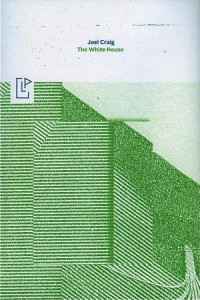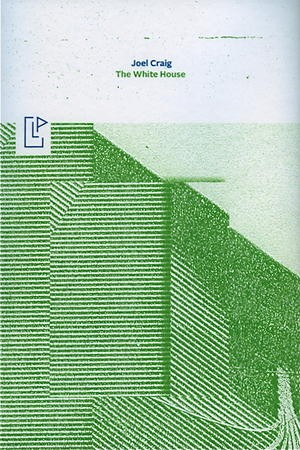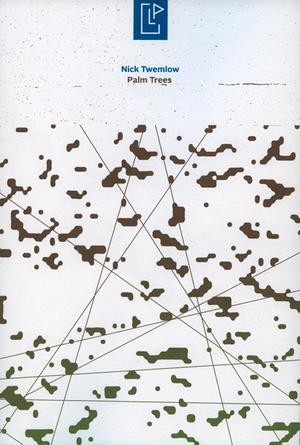 The White House
The White House
by Joel Craig
Green Lantern Press, 2012
80 pages / Dust jacket edition $20; Regular edition $15
&
Palm Trees
by Nick Twemlow
Green Lantern Press, 2012
82 pages / Dust jacket edition $20; Regular edition $15
Two synchronous 2012 releases, Joel Craig’s The White House and Nick Twemlow’s Palm Trees, invoke the communal support Chicago’s Green Lantern Press evokes in its intimate independent practice: small groups collaborate in the sort of devotion that can only survive beyond the constraints of money, friends sutured together in the simple creation of works of beauty.
Craig and Twemlow are longtime Chicago friends. Craig co-founded and curates the Danny’s Reading Series, and is the poetry editor for MAKE: A Literary Magazine. Twemlow now lives in Iowa City, where he writes and makes films. He also co-edits Canarium Books.
Because of Craig and Twemlow’s friendship, Green Lantern’s founder, Caroline Picard (who launched the Press and Gallery years ago, with pal Nick Sarno) released their respective books of poetry simultaneously, so the friends could tour together.
No Green Lantern release is regular; every book steeps in curiosity, newness, the unexpected. Every release is bound with delicacy, according to the “slow media” approach, making each book a curatorial site. It feels limiting to call them books. They contain ephemeral inserts, silk screen covers; artist plates.
The books might be siblings. They do bear some physical resemblance:
If these books are siblings, then the narrators are brothers. Brothers teeming with empathy, brothers who have lost their own brothers to death or waking nightmares. Where the narrator of Palm Trees is a kaleidoscope of modernity—self-aware corporate drone, debaser with a heart of gold, wary of war and celluloid, seeking after some peace in this black helicopter-, karate-laden landscape—the speaker of The White House is gentle, quiet, and straightforward, craving a world in which people are kind to one another, say what they mean, love with their bodies rather than the “labyrinthine caverns” of their minds, so protecting themselves from the disembodied governing State.
Craig writes in his poem, “The Dead C”:
Most of us who’ve managed to live
beyond twenty-five or thirty have got some cautionary voice that says Hold it,
Watch it. Is this person genuine; is he who he really seems to be?
And goes on to question the veracity of language in “Street Dad,” which concludes:
I sat for a moment, staring at my knees as I tried
to put broad, wide images
into small, tidy words.
Twemlow’s narrator lingers less on language’s limitations, and more on its restorative power against a twilit world of holes, surveillance helicopters, corruption, where a recurrent image of a starling seems to resuscitate the speaker, who proclaims in “Palm Trees / 5”:
My last defense is the present tense. The polis polish the dew
on the grassy knoll as the lone gunmen sync their watches.
If these narrators are brothers, they might even be twins, born in the same hour. For if there is any thread conjoining these two works despite their physical resemblance, it is their relationship to the cursèd, transcendent minute. For Craig, time is awry before the book even “begins,” starting with a “pause”; this same “pause” recurs again, further down the page, at the book’s mid-point; a final “pause” completes the text, at the page’s bottom line.
Craig’s narrator’s relationship to time is thus a resigned, wizened one, laden in the awareness that language is a great part of the wherefore. One of the first poems, “Schema,” implies the distortion wrought in the necessity of naming, which implies a fissure between identity and truth:
He was born as his name implies
as though distortion weren’t enough
in itself to frighten good, innocent people.
Even little children utter bold words,
but that’s not the half.
There remains an apology that is due.
How necessary it is we keep secrets.
Twemlow’s narrator echoes this knowledge, in “Palm Trees / 11,” that laden in the problematic act of naming is the fraught reality of shrinking time:
Memory only reminds me that I continue to forget things.
“Palm Trees,” Twemlow’s collection’s title “poem,” is a series of 21 short-shorts, a “hazardous fray of jump cuts,” a marvelous, streaming commentary on the cult of image, purveyed by the palm-laden landscape of America’s strangest city.
“Palm Trees / 1” begins:
Everything here is an establishing shot, and once something has been established, what happens next?
Twemlow’s language bleats primal exaltation, his words offering, in “Palm Trees / 15,” the possibility of saving himnaatotor’s ica’s strangest city,ntinue to forget things.naming is the fraught reality of shrinking time: from a droning world of lack:
I…woke up at the bottom of Lake Michigan clutching my manuscript…woke up in a clausal phrase you’d edit out.
But by the 17th “tree,” Twemlow’s narration etches into a “slurry sermon,” unraveling further by number 18, losing sound:
Soundtrack trimmed from the budget, and must go with the image alone.
The entries become more and more feverish, the mundane bleeding into the divine—“taxis are orgiastic”—awe is expressed for frothing streetlamps, dripping ever more dreamy and rare until the freedom of the twenty-first and final cut of the sequence:
When I stepped onto the sidewalk today I heard a car backfire not as a gun. I heard it simply as a car backfiring. I was liberated.
Liberation comes when the image is abandoned, and the act stands in only for itself; it does not reference the celluloid grotesque, but only a simple mechanical failure. So the “Palm Trees” cycle ends:
After I’m gone, who will stop to consider this awkward butterfly, slurring from tree branch to porch rail, that hawks the latent, indivisible dream, adrift in the history of air, its spastic circulars of flight, death nearing, as is its wont, and with that final swish of its wings, exactly nothing happens?
Perhaps acknowledging death as a final, empty wing-swish, a sheer moment in which “nothing happens,” is why Twemlow’s narrator can say, in “Jonestown”:
But to me death is not—death is not a fearful thing.
Craig’s narrator would agree. “The Second Half of the Flight” ends:
Why should I fear dead friends
who love me?
Twemlow’s “Palm Trees / “6”: “we’ve concluded that it’s better to feel alive than to be alive”—pulses in affinity with Brother Craig, whose narrator knows something about this fissure between observation and performance, heralding his own West Coast denunciation in “California Poem”:
What is needed is a recognizable molecule that carries the unstable
promise to the brain. A good-humored Buddha
area of the self.I’ve tried and tried but it keeps slipping away. We stopped
at a spot overlooking the bay
at the same time both observing and performing.
This imagery recurs after the mid-way “pause” of The White House, in “High Park,” which ends:
The sight of the great seated Buddha on the path
above the garden pierces my heart.
And in “Instructions for Building a Paper House”:
There was a body to look at,
a face to look on, to focus on.
But floating upwards.
Craig seems to be implying that a more physical approach to love could create a world in which the “labyrinthine caverns” of the subconscious mind stop getting in its way. Again, “High Park”:
To be too thorough or specific about sensing possible let-downs
in a possible romance is to establish
a place for them in the subconscious mind.
Later, in “The Second Half of the Flight”:
Real caring, like love, cannot be forced,
and she should have sufficient insight of her own
to be aware of what her feelings toward me really are.
The bright, pulsing heart steeps through The White House in the way starlings flit through Palm Trees, the effect being to transcend a world that is out of synch, full of holes, absent of poetry.
I’d like to say a word for Twemlow’s poem, “May 31, 2005—on the occasion of Walt Whitman’s 186th birthday ,” a lucid and lovely invocation of the poet, traversing the temporal bounds to imply his ecstatic vision as it unites the dregs of filth with the sheer bliss of the divine:
It bleeds our rust. This dust. This
afternoon light reveals the motes
of it. The fire was no accident.
We sing of it, the fire. We sing of it,
the sorrow. We sing for the dust
swept into the dustpan, emptied
into the garbage, trucked out
to the dump. A child’s bicycle
tossed near. The wheel spins.
An owl does not alight
on it. The owl is not signing it.
Tu-whit. Tu-whoo. Tu-whee.
Which is all to say, as Craig writes in “Harry Nilsson: Now that I am a spaceman, nobody cares about me.—Harry Nilsson, ‘Spaceman’”:
Love is something you have to learn.
***
August Evans thinks long and hard about that wild sound. http://augustevans.blogspot.com/.
Tags: August Evans, green lantern press, Joel Craig, Nick Twemlow, Palm Trees, The White House



[…] Nick Twemlow and Joel Craig got a great review for their new books, Palm Trees and The White House on htmlgiant today. I’ve included an excerpt below, but you can read the entire, incredibly thoughtful piece by going here. […]